Scientific Posters
Below you will find information about the scientific posters that will be exhibited during the workshop. All posters are authored by PhD Students from IMDEA Networks and their supervisors.
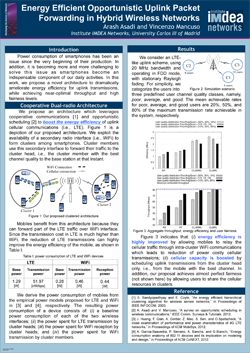
Title: Energy Efficient Opportunistic Uplink Packet Forwarding in Hybrid Wireless Networks
Authors: Arash ASADI, PhD Student & Vincenzo MANCUSO, Staff Researcher & PhD Supervisor, Institute IMDEA Networks
Abstract: Opportunistic schedulers have been primarily proposed to enhance capacity of cellular networks. However, little is known about opportunistic scheduling with fairness and energy efficiency constraints. In this work, we show that adapting opportunistic scheduling can dramatically ameliorate energy efficiency for uplink transmissions, while achiev- ing near-optimal throughput and high fairness. To achieve this goal, we propose a novel two-tier uplink forwarding scheme in which users cooperate, in particular by forming clusters of dual-radio mobiles in hybrid wireless networks.
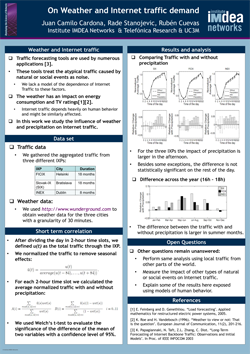
Title: On Weather and Internet traffic demand
Authors: Juan Camilo CARDONA, PhD Student, Institute IMDEA Networks & Rade STANOJEVIC, Researcher, Telefonica I+D & Rubén CUEVAS, Assistant Professor, UC3M
Abstract: The weather is known to have a major impact on demand of utilities such as electricity or gas. Given that the Internet usage is strongly tied with human activity, one could guess the existence of similar correlation between its traffic demand and weather conditions. In this paper, we empirically quantify such effects. We find that the influence of precipitation depends on both time of the day as well as time of the year, and is maximal in the late afternoon over summer months.
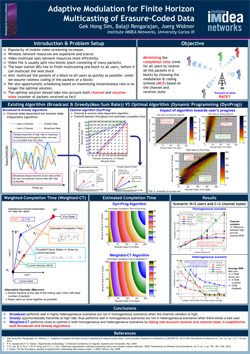
Title: Adaptive Modulation for Finite Horizon Multicasting of Erasure-coded Data
Authors: Sim (Allyson) GEK HONG, PhD Student & Joerg WIDMER, Chief Researcher & PhD Supervisor, Institute IMDEA Networks
Abstract: We design an adaptive modulation scheme to support opportunistic multicast scheduling in wireless networks. Whereas prior work optimizes capacity, we investigate the finite horizon problem where (once or repeatedly) a fixed number of packets has to be transmitted to a set of wireless receivers in the shortest amount of time a common problem, e.g., for software updates or video multicast. In the finite horizon problem, the optimum coding and modulation schemes critically depend on the recent reception history of the receivers and require a fine balance between maximizing overall throughput and equalizing individual receiver throughput. We formulate a dynamic programming algorithm that optimally solves this scheduling problem. We then develop two low complexity heuristics that perform very close to the optimal solution and are suitable for practical online scheduling in base stations. We further analyze the performance of our algorithms by means of simulation in a wide range of wireless scenarios. They substantially outperform existing solutions based on throughput maximization or favoring the user with the worst channel, and we obtain around 35% performance improvement over the former and about 100% improvement over the latter in a scenario with Rayleigh fading.
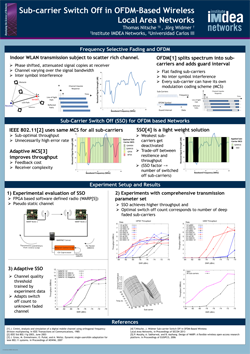
Title: Sub-carrier Switch Off in OFDM-Based Wireless Local Area Networks
Authors: Thomas NITSCHE, PhD Student & Joerg WIDMER, Chief Researcher & PhD Supervisor, Institute IMDEA Networks
Abstract: OFDM based wireless communication systems split the available frequency band into so-called sub-carriers, and data is transmitted on each of these sub-carriers in parallel. With frequency selective fading, sub-carriers may experience different channel qualities. Thus, choosing a different modulation and coding scheme (MCS) per sub-carrier improves performance. However, this comes at an increase in transceiver complexity and no current wireless system adapts the MCS at such a fine granularity. Some OFDMA based systems such as LTE allow to adapt the MCS per user, whereas wireless local area networks as specified by IEEE 802.11 use the same MCS on every sub-carrier.
The performance of such wireless systems that use a single MCS in a frequency selective fading channel can be significantly improved through Sub-Carrier Switch Off (SSO), a simple but powerful alternative to adaptive MCS. SSO deactivates weak sub- carriers that excessively raise the error probability to improve the overall throughput. We implement and test SSO in a software-defined radio testbed based on the Wireless Open Access Research Platform (WARP). We present a novel light-weight method for selecting the sub-carriers to be switched off based on the per-sub-carrier channel quality. The results we obtain from our measurements indicate that throughput increases of up to 250% are possible and thus SSO is a highly promising and very low complexity mechanism for future wireless local area networks.
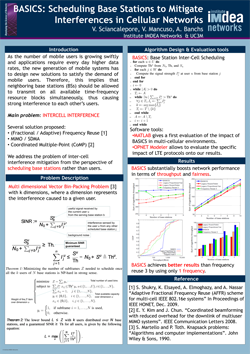
Title: BASICS: Scheduling Base Stations to Mitigate Interferences in Cellular Networks
Authors: Vincenzo SCIANCALEPORE, PhD Student & Albert BANCHS, Deputy Director & PhD Supervisor, Institute IMDEA Networks
Abstract:
The increasing demand for higher data rates in cellular network results in increasing network density. As a consequence, inter-cell interference is becoming the most serious obstacle towards spectral efficiency. Therefore, considering that radio resources are limited and expensive, new techniques are required for efficient radio resource allocation in next generation cellular networks. In this paper, we propose a pure frequency reuse 1 scheme based on base station scheduling rather than the commonly adopted user scheduling. In particular, we formulate a base station scheduling problem to determine which base stations can be scheduled to simultaneously transmit, without causing excessive interference to any user of any of the scheduled base stations. We show that finding the optimal base station scheduling is NP-hard, and formulate the BASICS (BAse Station Inter-Cell Scheduling) algorithm, a novel heuristic to approximate the optimal solution at low complexity cost. The proposed algorithm is in line with the ABSF (almost blank sub-frame) technique recently standardized at the 3GPP. By means of numerical and packet-level simulations, we prove the effectiveness and superiority of BASICS as compared to the state of the art of inter-cell interference mitigation schemes.
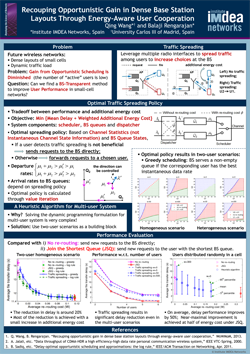
Title: Recouping Opportunistic Gain in Dense Base Station Layouts Through Energy-Aware User Cooperation
Authors: Qing WANG, PhD Student & Balaji RENGARAJAN, Staff Researcher & PhD Supervisor, Institute IMDEA Networks
Abstract: To meet the increasing demand for wireless capacity, future networks are likely to consist of dense layouts
of small cells. Thus, the number of concurrent users served by each base station (BS) is likely to be small which results in
diminished gains from opportunistic scheduling, particularly under dynamic traffic loads. We propose user-initiated BS-
transparent traffic spreading that leverages user-to-user communication to increase BS scheduling flexibility. The proposed
scheme is able to increase opportunistic gains and improve user performance. For a specified tradeoff between performance and power expenditure, we characterize the optimal policy by modeling the system as a Markov decision process and also present a heuristic algorithm that yields significant performance gains. Our simulations show that, in the performance-centric case, average file transfer delays are lowered by up to 20% even in homogeneous scenarios, and up to 50% with heterogeneous users. Further, we show that the bulk of the performance improvement can be achieved with a small increase in power expenditure, e.g., in an energy-sensitive case, up to 78% of the performance improvement can be typically achieved at only 20% of the power expenditure of the performance-centric case.
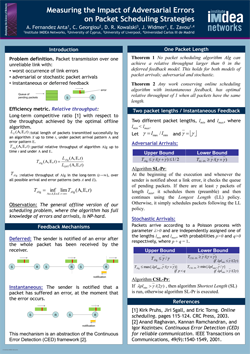
Title: Measuring the Impact of Adversarial Errors on Packet Scheduling Strategies
Authors: Elli ZAVOU, PhD Student, Institute IMDEA Networks & Antonio FERNÁNDEZ ANTA, Senior Researcher & PhD Supervisor, Institute IMDEA Networks
Abstract: In this paper we explore the problem of achieving efficient packet transmission over unreliable links with worst case occurrence of errors. In such a setup, even an omniscient offline scheduling strategy cannot achieve stability of the packet queue, nor is it able to use up all the available bandwidth. Hence, an important first step is to identify an appropriate metric for measuring the efficiency of scheduling strategies in such a setting. To this end, we propose a relative throughput metric which corresponds to the long term competitive ratio of the algorithm with respect to the optimal. We then explore the impact of the error detection mechanism and feedback delay on our measure. We compare instantaneous error feedback with deferred error feedback, that requires a faulty packet to be fully received in order to detect the error. We propose algorithms for worst-case adversarial and stochastic packet arrival models, and formally analyze their performance. The relative throughput achieved by these algorithms is shown to be close to optimal by deriving lower bounds on the relative throughput of the algorithms and almost matching upper bounds for any algorithm in the considered settings. Our collection of results demonstrate the potential of using instantaneous feedback to improve the performance of communication systems in adverse environments.




